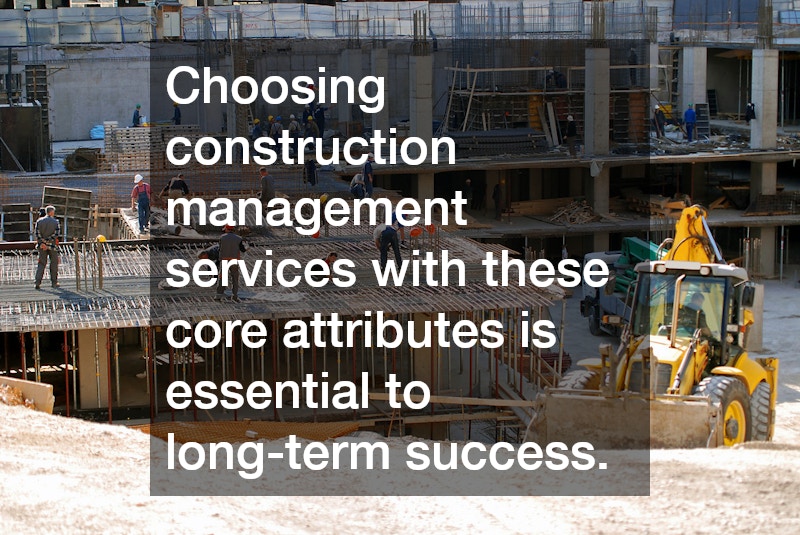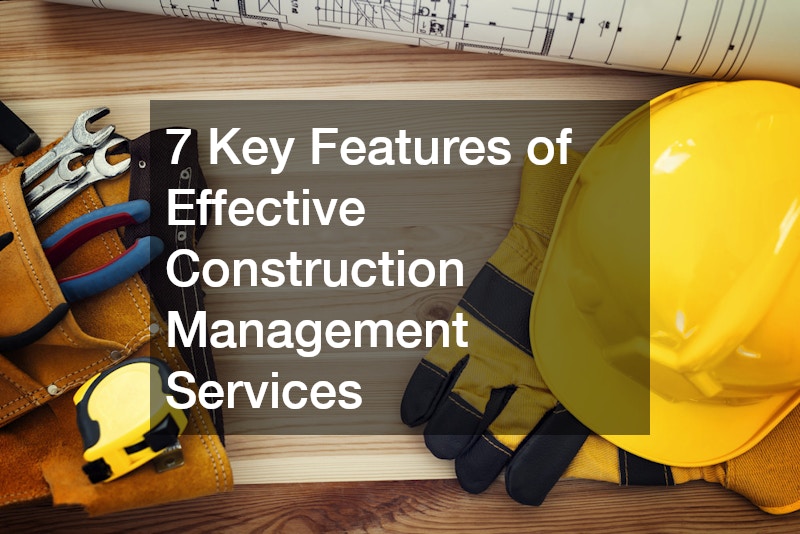In the dynamic and demanding world of building and infrastructure development, successful project delivery hinges on more than just skilled labour and quality materials. At the heart of every well-executed build lies a robust framework of construction management services. These services are crucial for coordinating people, resources and timelines while maintaining compliance and safety standards.
When executed effectively, they drive efficiency, minimise risk and ensure each stakeholder’s expectations are met or exceeded. Understanding the key features of effective construction management services is vital for developers, property owners and contractors seeking successful project outcomes.
Strategic Planning and Scheduling
The backbone of effective construction management is a well-developed strategic plan. Every project begins with a detailed blueprint outlining goals, milestones and timelines. This strategic foundation ensures all moving parts are synchronised from design to final inspection. The ability to forecast potential delays and allocate resources accordingly is a sign of expert management.
Schedules are meticulously crafted and adjusted to account for weather impacts, labour availability and procurement timelines, ensuring progress remains uninterrupted. Without such planning, even the most promising projects can quickly spiral into delays and budget overruns. Effective managers use advanced scheduling tools and data analytics to maintain clarity and control throughout the entire build process.
Clear Communication and Collaboration
Successful construction projects rely heavily on clear communication across all tiers. From site supervisors to architects and stakeholders, seamless collaboration fosters unity and prevents costly misunderstandings. Construction management services that emphasise open dialogue ensure that any issues are identified and resolved promptly. Communication platforms tailored for the construction industry play a key role in keeping everyone informed and accountable.
Regular meetings, transparent reporting and quick decision-making mechanisms strengthen coordination. When everyone from the subcontractors to the financial controllers operates with aligned expectations, the entire project benefits from reduced friction and increased trust.
Budget Control and Cost Management
Cost overruns are a common concern in construction, making financial control an essential feature of effective management. Strong cost management begins with precise budget estimations during the planning phase and continues through rigorous tracking of expenses throughout the project. Managers must be adept at analysing costs, identifying variances and implementing corrective actions swiftly. Construction management services that deliver value are those that secure competitive pricing without compromising on quality. They also leverage relationships with suppliers and subcontractors to negotiate favourable terms.
Ultimately, cost efficiency does not stem from cutting corners but from vigilant oversight and strategic procurement.
Risk Assessment and Mitigation
Construction sites are inherently high-risk environments, where unforeseen challenges can quickly derail progress. A critical feature of superior construction management is proactive risk identification and mitigation. Effective services begin each project with a comprehensive risk analysis that includes safety, financial and logistical considerations. Contingency plans are put in place to address potential obstacles ranging from supply chain disruptions to legal compliance issues.
Managers must stay abreast of changes in regulations, workplace health and safety standards and environmental conditions that may affect the site. Through careful monitoring and flexible planning, risks are addressed before they evolve into larger problems, safeguarding timelines and budgets.
Quality Assurance and Compliance
Maintaining high standards of workmanship while ensuring all activities comply with regulatory frameworks is a defining characteristic of reliable management. Construction management services that integrate quality assurance procedures into daily operations establish benchmarks and conduct routine inspections to uphold excellence.
These practices not only ensure that each phase of construction adheres to the agreed specifications but also confirm alignment with building codes, environmental laws and occupational safety standards. Skilled managers also oversee subcontractors and tradespeople, ensuring that everyone maintains the expected levels of performance. A commitment to quality from start to finish prevents rework, legal complications and client dissatisfaction.
Technological Integration
Modern construction management demands the integration of technology to improve accuracy, efficiency and communication. From Building Information Modelling (BIM) to real-time project tracking software, digital tools empower teams to visualise, coordinate and manage every aspect of a project. The adoption of mobile technology allows instant access to plans, reports and updates from anywhere on-site, facilitating faster decision-making and better oversight.
Managers who embrace these technologies can streamline operations, reduce paperwork and ensure more accurate forecasting and reporting. Furthermore, data collected from these tools supports continuous improvement, helping teams learn from each project and refine their approach for the future.
Leadership and Team Management
Finally, strong leadership is at the core of all effective construction management services. Beyond administrative expertise, managers must exhibit the ability to lead diverse teams through complex challenges. Motivating workers, resolving conflicts and maintaining morale are everyday responsibilities. Leadership is demonstrated through the ability to inspire confidence, communicate vision and maintain discipline under pressure.
When managers lead by example and foster a culture of accountability and respect, the entire workforce performs with greater focus and dedication. High-functioning teams reflect the quality of their leadership and successful projects often share this common trait of strong, hands-on management.
Construction management services play a pivotal role in turning architectural vision into reality. From initial planning through to project completion, effective management ensures resources are used wisely, risks are mitigated and quality remains uncompromised. The most successful services are defined by strategic planning, clear communication, strong budget control, proactive risk management, rigorous quality assurance, modern technology adoption and exceptional leadership. When these features are present, projects are more likely to be delivered on time, within budget and to a high standard of workmanship. For stakeholders seeking reliability and excellence in their building ventures, choosing construction management services with these core attributes is essential to long-term success.
.




